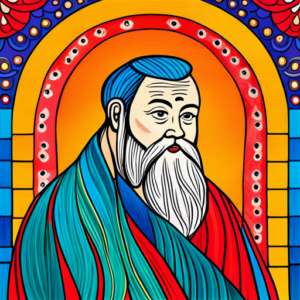
Autobiography of Cleopatra
Early Life
As the child of Pharaoh Ptolemy XII Auletes, my life was steeped in luxury, yet fraught with danger. I was born in 69 BCE, in the heart of Alexandria. Despite being a woman in a time when power often belonged solely to men, I was determined to claim my rightful place.
From an early age, I was educated in the Palace of Alexandria. Unlike many of my royal siblings, I showed an appetite for learning. With a command over several languages – Greek, Aramaic, Hebrew, Arabic, and Latin among them – my intellect set me apart. In me, the wisdom of the ages lived on, a true daughter of the Ptolemies.
Ascension to Power
Following the death of my father in 51 BCE, I, a young woman of eighteen, ascended to the throne. According to my father’s will, I was to marry my younger brother, Ptolemy XIII, who was only ten. This was a marriage of political convenience, not love. I knew that to truly rule, I needed to consolidate my power, using any means necessary.
But being a female ruler in a patriarchal society was not without its trials. I was forced into a perilous game of politics and alliances, my throne constantly under threat from those closest to me.
Exile and Return
When I attempted to solidify my rule, my brother and his influential advisors seized this opportunity to overthrow me. I was exiled in 49 BCE, a deposed queen. But I was not ready to fade into obscurity.
In a legendary display of cunning and bravery, I smuggled myself back into Alexandria, concealed within a rolled-up carpet, right into the quarters of the Roman general, Julius Caesar. He was intrigued by my audacity and intellect, and we formed a potent alliance. He aided me in reclaiming my throne, defeating Ptolemy XIII in the Battle of the Nile.
The Roman Alliance
Julius Caesar and I shared more than just a political alliance – we became lovers and I bore him a son, Caesarion. This union, however, was short-lived. Caesar’s assassination in 44 BCE shattered my dreams of a joint Roman-Egyptian empire.
Fate brought another Roman general, Mark Antony, into my life. Our alliance was political, romantic, and deeply passionate. Antony’s love for me was legendary and together, we sought to create a powerful Eastern empire. I bore Antony three children: twins Alexander Helios and Cleopatra Selene II, and Ptolemy Philadelphus.
The Battle of Actium
In 31 BCE, my world turned upside down. Octavian, Caesar’s adopted son, declared war on me and Antony. This culminated in the catastrophic Battle of Actium. Antony and I were defeated, our dreams of an Eastern empire crushed. This defeat marked the end of an era, the death knell of the Hellenistic Age.
The End of an Era
In 30 BCE, with Octavian’s forces closing in on Alexandria, I took my own life to avoid capture. Antony, upon hearing false news of my death, fell on his sword. But before I joined him in death, we shared one final moment together. He died in my arms, a tragic end to our legendary love.
Then, to avoid becoming a Roman spectacle, I ended my life in the time-honored Egyptian tradition, choosing to face the asp, the symbol of divine royalty.
Through my life and death, I hope to be remembered not just as Cleopatra, the last queen of Egypt, but as a woman of intellect, courage, and passion. A woman who dared to dream, love, and fight in a world that sought to undermine her at every step. I am Cleopatra – not just a queen, but a symbol of enduring power and allure.
Show more +Show less –











